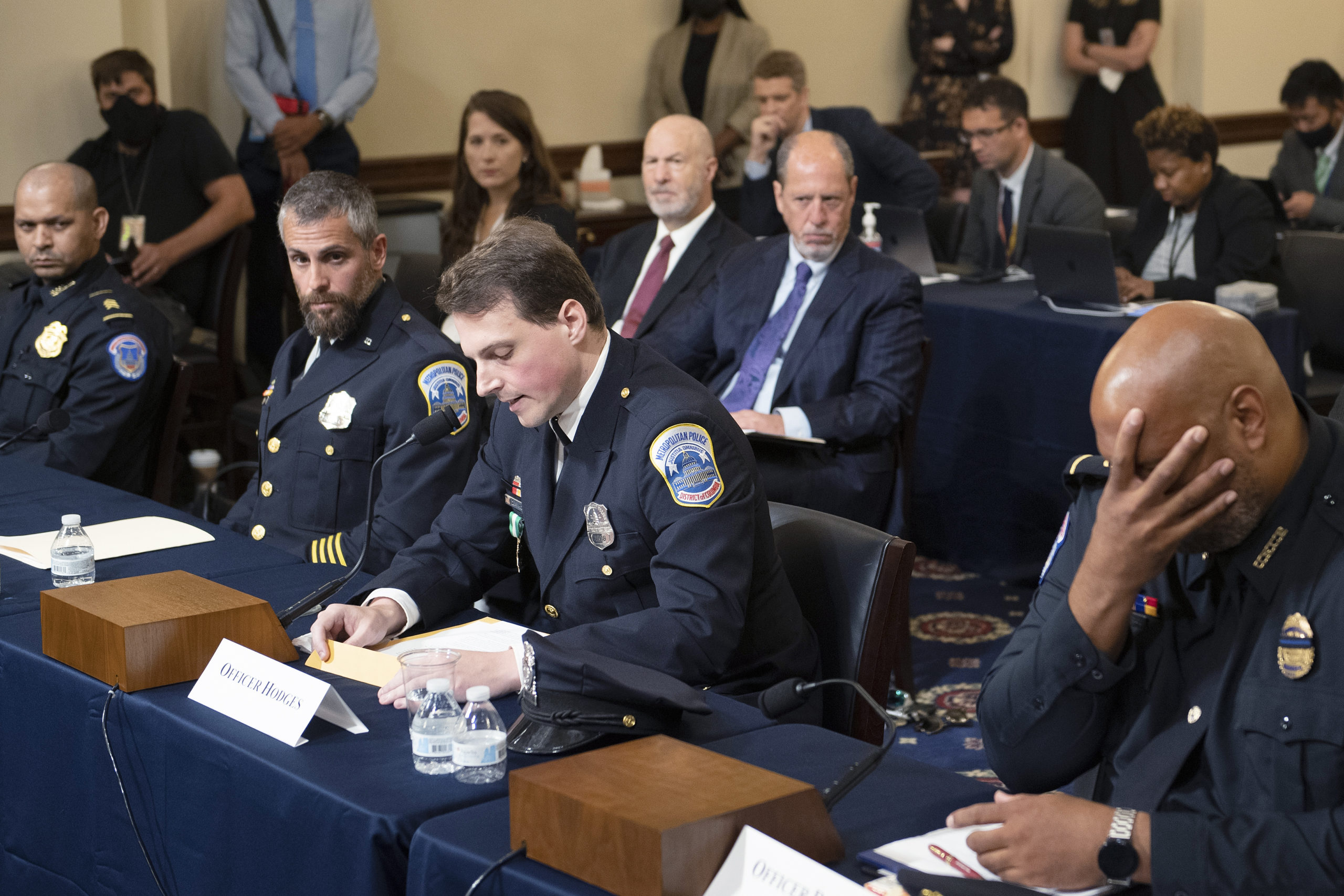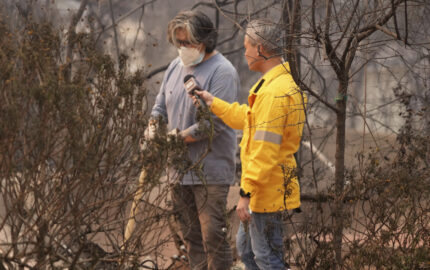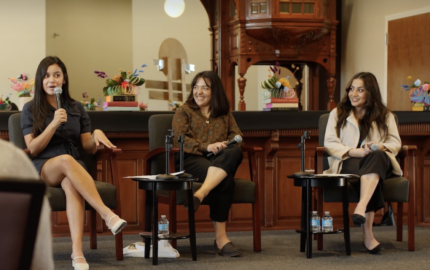Seems we need a reminder.
On Jan. 6, 2021, the nation’s Capitol building was attacked — not figuratively, but literally. Thousands of people descended upon D.C. in an attempt to stop the certification of the results from the 2020 presidential election. A handful of people died, either on the day or in the following days. More than 140 Capitol police officers sustained injuries after being beaten by mobs using flag poles and other items as weapons. Pipe bombs and material for IEDs were found in the area. The certification process had to be halted for several hours before order could be restored, but not before millions of dollars of damage had been inflicted.
Things likely would have been bloodier had the insurrectionists been mostly Black rather than mostly white, because the response would have been more lethal and heavy-handed, the kind we saw throughout the country — and in D.C. — during protests that erupted after a Minnesota cop murdered George Floyd.
We saw it unfold live on TV during national broadcasts. We’ve since had multiple news outlets pull together extensive timelines and video journalism to document just how bad things were. In the immediate aftermath, even top Republicans such as Sen. Lindsey Graham and House Minority Leader Kevin McCarthy spoke forthrightly about what happened and why, linking it squarely to the months-long agitation by then-President Donald Trump based on a lie that an election victory was stolen from him.
It was one of the darkest days in the country in recent memory.
Hundreds of indictments and charges have been levied against many of those who participated, with some already pleading guilty and serving jail time. During negotiations to establish a credible way to fully investigate what happened to better understand its causes — and maybe prevent another frontal assault on our democracy — the Democratic-led House took the unusual step of acceding to Republican demands to ensure the committee charged with doing the investigating wouldn’t be partisan. (When a Republican-led House investigated Benghazi, the GOP didn’t do the same.)
McCarthy spoke against the commission anyway. Senate Minority Leader Mitch McConnell whipped votes against it, scuttling it and forcing Speaker Nancy Pelosi to establish a committee on her own. Among her picks, she included Republican Rep. Liz Cheney.
That bears repeating.
Democrats, the party in power, took steps to ensure a bipartisan approach — bipartisan in make-up and shared power. It was rejected by Republican leaders in the House and Senate.
An attempt to better understand why Jan. 6 happened was not rejected by both sides — just one. That side, the GOP, tried to undermine Pelosi’s committee by trying to appoint two well-known firebrands who have been spending time peddling disinformation about the attempted insurrection. Pelosi rejected them, then added another conservative, Rep. Adam Kinzinger, to the committee.
Those facts aren’t in dispute.
And still we saw journalists describe what happened this way…
Politico’s Rachael Bade in a tweet: “Pelosi’s move to reject GOP picks for the 1/6 panel is going to be a gift to Kevin McCarthy in the long run. He wanted this panel to look partisan and political. Now it’s definitely going to look partisan and political.”
From CNN’s Chris Cillizza: “If you ever held any hope that the House select committee on the January 6 US Capitol riot might produce a report that would help us understand what happened in the lead-up to that day and, in so doing, provide us avenues to keeping it from happening again, you should give up on those hopes now. The reason? Speaker Nancy Pelosi’s decision Wednesday to reject two of the five nominees — Jim Jordan of Ohio and Jim Banks of Indiana — put forward by House Minority Leader Kevin McCarthy to serve on the panel.”
From Kris Van Cleave on “CBS This Morning” over a chryon that said “January 6th committee fight: Plans for bipartisan investigation in disarray”: “Let’s be clear here. Both parties are going to claim victory because this plays directly to their bases.”
Yes, let’s be clear here.
That type of political journalism helps shape public perceptions as much or maybe more than the actions of politicians.
That type of political journalism would be largely responsible if a “disarray” narrative takes hold, if the public believes efforts to investigative Jan. 6 were just more partisan politics.
It’s distressing because the facts are clearer on this political issue than most others. Democrats have been trying to investigate a direct assault on our democracy. The GOP has been trying to gum up those efforts, so much so that a growing number of Republicans want Cheney and Kinzinger punished. That it is easier for Democrats to take a principled stance because Trump supporters formed the bulk of the attackers that day doesn’t change those truths.
And yet too many journalists refuse to speak plainly about what’s going on, even though our job is to bring clarity to our audiences, rather than further muddle their understanding of an always-messy American political system.
If we can’t do that about an attempted insurrection, can we ever?
It’s a question we need to answer — and soon.
We are stewards of a profession that was given a shoutout in the Bill of Rights because what we do is that essential to making this democracy work. That makes us advocates and activists, whether we want to admit it or not.
It means we must pick a side, not of a particular political party but for this democratic experiment itself.
And if you’re still skittish, remember that Pelosi chose Democrats and Republicans for the committee when she could have chosen only Democrats. If you don’t feel comfortable defending democracy with truth, highlighting that bipartisanship remains an option.
Issac Bailey, a 2014 Nieman Fellow, is a journalist, race relations seminar creator and facilitator, and the author of “Why Didn’t We Riot? A Black Man in Trumpland” (Other Press, October 2020).
On Jan. 6, 2021, the nation’s Capitol building was attacked — not figuratively, but literally. Thousands of people descended upon D.C. in an attempt to stop the certification of the results from the 2020 presidential election. A handful of people died, either on the day or in the following days. More than 140 Capitol police officers sustained injuries after being beaten by mobs using flag poles and other items as weapons. Pipe bombs and material for IEDs were found in the area. The certification process had to be halted for several hours before order could be restored, but not before millions of dollars of damage had been inflicted.
Things likely would have been bloodier had the insurrectionists been mostly Black rather than mostly white, because the response would have been more lethal and heavy-handed, the kind we saw throughout the country — and in D.C. — during protests that erupted after a Minnesota cop murdered George Floyd.
We saw it unfold live on TV during national broadcasts. We’ve since had multiple news outlets pull together extensive timelines and video journalism to document just how bad things were. In the immediate aftermath, even top Republicans such as Sen. Lindsey Graham and House Minority Leader Kevin McCarthy spoke forthrightly about what happened and why, linking it squarely to the months-long agitation by then-President Donald Trump based on a lie that an election victory was stolen from him.
It was one of the darkest days in the country in recent memory.
Hundreds of indictments and charges have been levied against many of those who participated, with some already pleading guilty and serving jail time. During negotiations to establish a credible way to fully investigate what happened to better understand its causes — and maybe prevent another frontal assault on our democracy — the Democratic-led House took the unusual step of acceding to Republican demands to ensure the committee charged with doing the investigating wouldn’t be partisan. (When a Republican-led House investigated Benghazi, the GOP didn’t do the same.)
McCarthy spoke against the commission anyway. Senate Minority Leader Mitch McConnell whipped votes against it, scuttling it and forcing Speaker Nancy Pelosi to establish a committee on her own. Among her picks, she included Republican Rep. Liz Cheney.
That bears repeating.
Democrats, the party in power, took steps to ensure a bipartisan approach — bipartisan in make-up and shared power. It was rejected by Republican leaders in the House and Senate.
An attempt to better understand why Jan. 6 happened was not rejected by both sides — just one. That side, the GOP, tried to undermine Pelosi’s committee by trying to appoint two well-known firebrands who have been spending time peddling disinformation about the attempted insurrection. Pelosi rejected them, then added another conservative, Rep. Adam Kinzinger, to the committee.
Those facts aren’t in dispute.
And still we saw journalists describe what happened this way…
Politico’s Rachael Bade in a tweet: “Pelosi’s move to reject GOP picks for the 1/6 panel is going to be a gift to Kevin McCarthy in the long run. He wanted this panel to look partisan and political. Now it’s definitely going to look partisan and political.”
From CNN’s Chris Cillizza: “If you ever held any hope that the House select committee on the January 6 US Capitol riot might produce a report that would help us understand what happened in the lead-up to that day and, in so doing, provide us avenues to keeping it from happening again, you should give up on those hopes now. The reason? Speaker Nancy Pelosi’s decision Wednesday to reject two of the five nominees — Jim Jordan of Ohio and Jim Banks of Indiana — put forward by House Minority Leader Kevin McCarthy to serve on the panel.”
From Kris Van Cleave on “CBS This Morning” over a chryon that said “January 6th committee fight: Plans for bipartisan investigation in disarray”: “Let’s be clear here. Both parties are going to claim victory because this plays directly to their bases.”
Yes, let’s be clear here.
That type of political journalism helps shape public perceptions as much or maybe more than the actions of politicians.
That type of political journalism would be largely responsible if a “disarray” narrative takes hold, if the public believes efforts to investigative Jan. 6 were just more partisan politics.
It’s distressing because the facts are clearer on this political issue than most others. Democrats have been trying to investigate a direct assault on our democracy. The GOP has been trying to gum up those efforts, so much so that a growing number of Republicans want Cheney and Kinzinger punished. That it is easier for Democrats to take a principled stance because Trump supporters formed the bulk of the attackers that day doesn’t change those truths.
And yet too many journalists refuse to speak plainly about what’s going on, even though our job is to bring clarity to our audiences, rather than further muddle their understanding of an always-messy American political system.
If we can’t do that about an attempted insurrection, can we ever?
It’s a question we need to answer — and soon.
We are stewards of a profession that was given a shoutout in the Bill of Rights because what we do is that essential to making this democracy work. That makes us advocates and activists, whether we want to admit it or not.
It means we must pick a side, not of a particular political party but for this democratic experiment itself.
And if you’re still skittish, remember that Pelosi chose Democrats and Republicans for the committee when she could have chosen only Democrats. If you don’t feel comfortable defending democracy with truth, highlighting that bipartisanship remains an option.
Issac Bailey, a 2014 Nieman Fellow, is a journalist, race relations seminar creator and facilitator, and the author of “Why Didn’t We Riot? A Black Man in Trumpland” (Other Press, October 2020).



